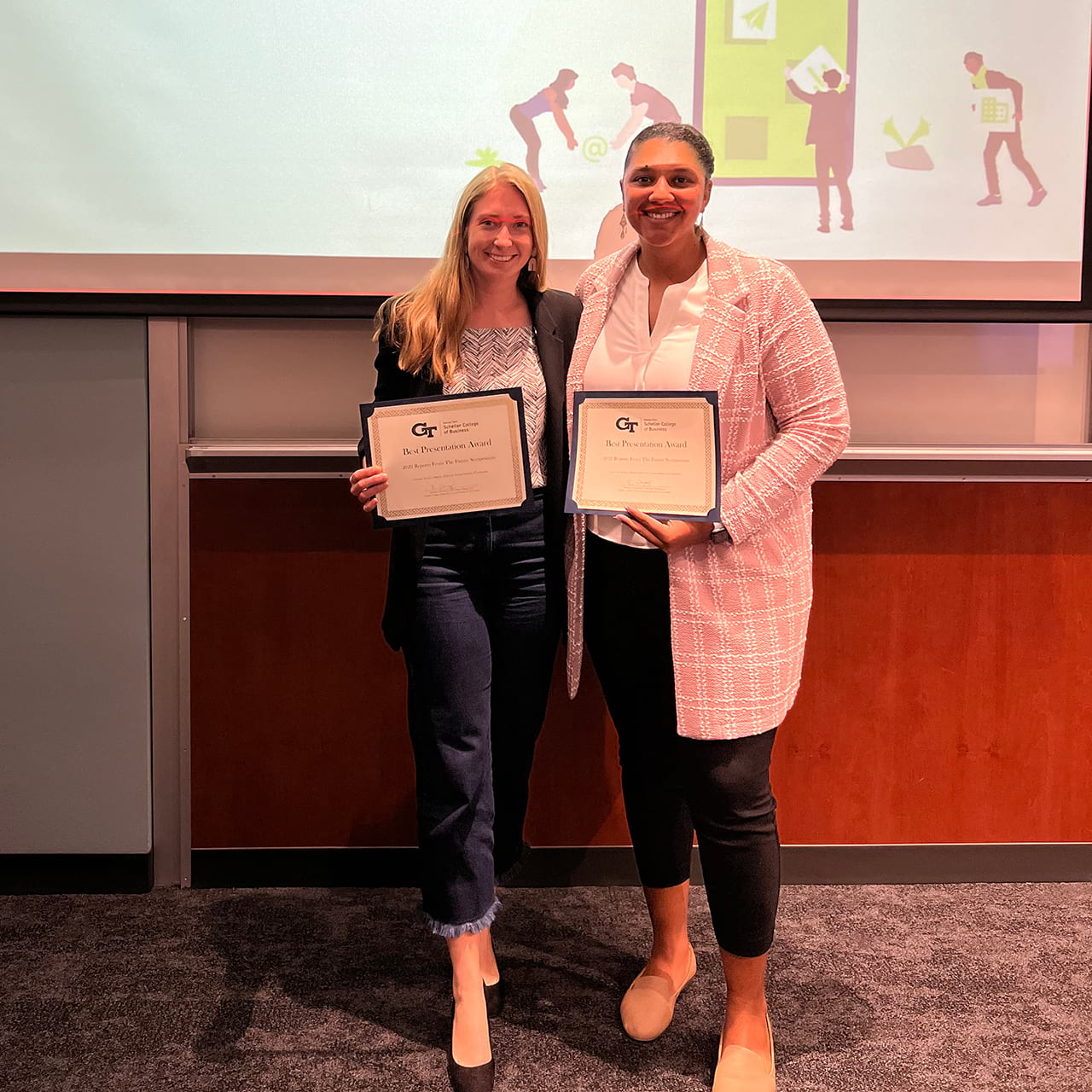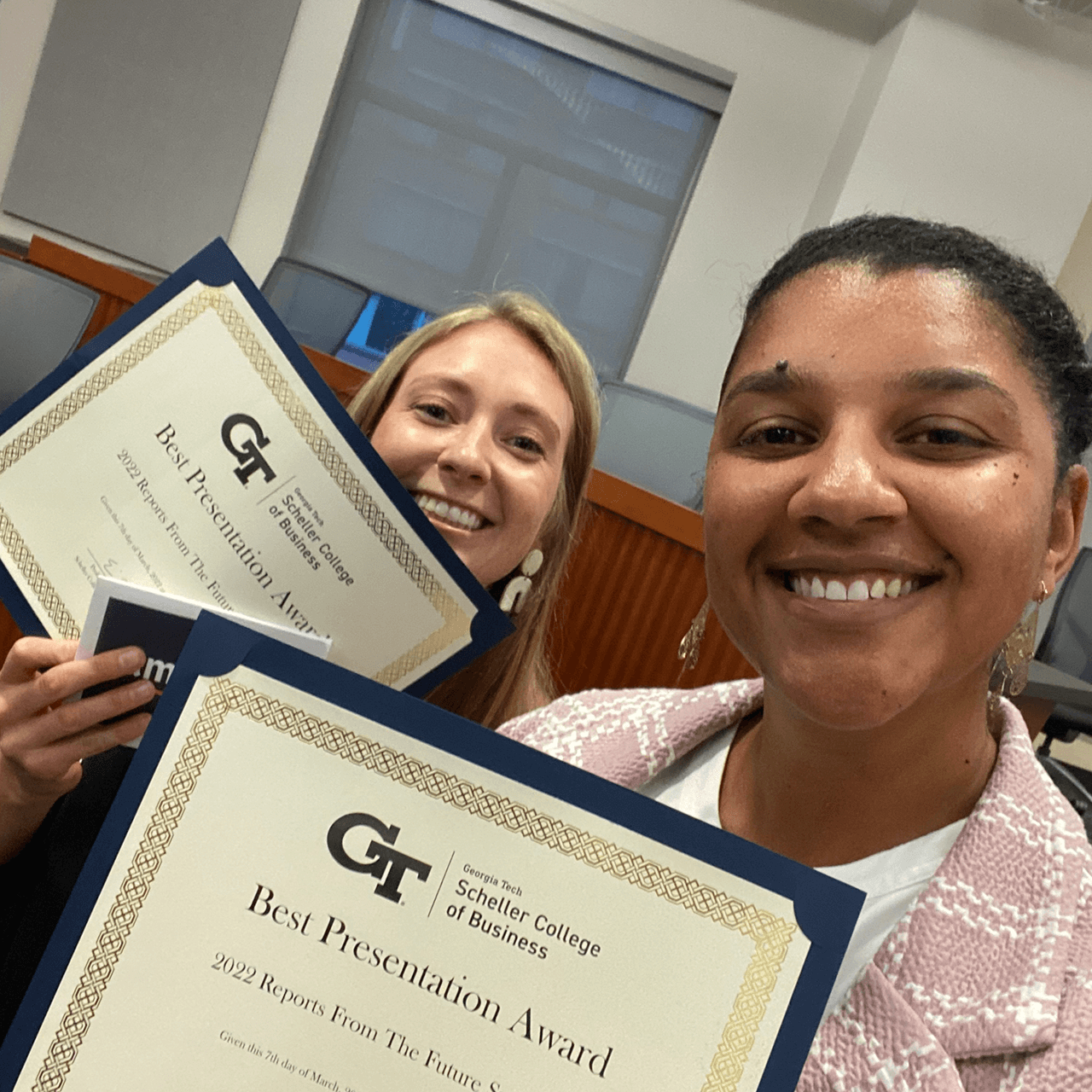The Ray C. Anderson Center for Sustainable Business (“Center”) proudly supports Scheller College of Business faculty in infusing sustainability into courses across the undergraduate and graduate curricula. For over four years, Center-affiliated faculty member Eric Overby has been integrating a special sustainability project into his undergraduate- and graduate-level courses on emerging technologies. Throughout the semester, students learn how to develop scenarios about the future, with particular emphasis on the effects of emerging technologies. In “Reports from the Future,” students put what they have learned into action with an eye turned to the impact of technologies on critical global environmental and social issues. Overby says, “I have students develop forecasts and scenarios about how things will develop in the future, so that we can identify actions to take now to make the most desirable future come to pass.” In this co-authored article, Francesca Sally (MBA 2022) and Carlisle Withers (MBA 2022) reflect on the experience of developing an award-winning report and presentation related to education in India.
Professor Eric Overby’s course, MGT 6059: Analysis of Emerging Technologies, challenges students to analyze emerging technologies and identify the implications of said technologies for individuals, businesses, markets, and society as a whole. When we took the course in Fall 2021, we analyzed technologies — such as self-driving cars, text generation models, and AI — as well as the ethics surrounding each advancement
The “Reports from the Future” assignment asked us to take a step into 2031 and look back on the preceding 30 years in the context of a societal problem related to one of the 17 United Nations Sustainable Development Goals (UN SDGs). We were tasked with providing specific examples of developments for 2001-2021 based on real world events; on top of that, we projected how we anticipated our problem would evolve from 2021-2031.
The SDGs provided a strong foundation for all the problems because they are, according to the UN, “a blueprint to achieve a better and more sustainable future for all.” The SDGs were launched in 2015, and the target year for reaching the goals was 2030. Our classroom projects were meant to provide a prediction of what obstacles must be overcome to reach these goals.
As our team (which also included Marcus Budline, Maria Harper, and Anthony Hodge — who received their MBAs this spring as well) explored possible topics, we discussed a podcast a few of us on our team had listened to and been inspired by. It featured entrepreneur Balaji Srinivasan, who expressed the woeful state of India's educational system and its potentially disastrous impact on India’s future GDP and job creation. In the end, our team decided that we were curious not only to explore the intersection of education and technology but also to learn more about India’s role in the world’s economy. Our project focused on UN SDG #4: Quality Education.
 From our research, we discovered that India continues to achieve far below its potential in education. According to a McKinsey report, more than 60 to 65 million jobs are potentially creatable by 2025 in India. However, without significant reskilling and retraining, the potential will be impossible to achieve. To fix the issue, elementary education will need to be reenvisioned. This level of education in India continues to lag far behind China and other developing nations. In 2021, only 22.3% of schools had access to the internet. Our team looked at how access to educational technology could greatly improve educational outcomes in India. We highlighted a variety of technologies with satellite internet providers, such as Starlink. We also looked at the growth of online education with for-profit platforms such as Coursera, Udemy, and Khan Academy.
From our research, we discovered that India continues to achieve far below its potential in education. According to a McKinsey report, more than 60 to 65 million jobs are potentially creatable by 2025 in India. However, without significant reskilling and retraining, the potential will be impossible to achieve. To fix the issue, elementary education will need to be reenvisioned. This level of education in India continues to lag far behind China and other developing nations. In 2021, only 22.3% of schools had access to the internet. Our team looked at how access to educational technology could greatly improve educational outcomes in India. We highlighted a variety of technologies with satellite internet providers, such as Starlink. We also looked at the growth of online education with for-profit platforms such as Coursera, Udemy, and Khan Academy.
We tried to be realistic with how we foresaw the future of education in India unfolding. As of 2021, there was a dire need for investment into the educational system. We predicted that by 2031, funding would come from both the private and public sectors, and that the expansion of the internet across the country would be a key factor for elevating and connecting the youth of India.
Better connectivity (in addition to basic sanitation) would have a big impact on girls in particular. We highlighted the importance of women’s rights while acknowledging that getting girls better access to education would require shifting the public’s sentiment towards gender equality. Using tools such as social media could help shape the public’s attitude towards education for girls.
 Carlisle Withers and Francesca Sally accept their “best presentation” awards for the Reports from the Future Symposium.
Carlisle Withers and Francesca Sally accept their “best presentation” awards for the Reports from the Future Symposium.
We projected some major shifts in India’s access to the internet through initiatives from companies such as Starlink and Apple, as well as through partnerships with Jio and Gofi. In our projection, Starlink will launch 20,000 satellites over five years, which will cover 85% of the globe. A partnership with a major corporation like Jio will allow 93% of India’s population to have access to the internet. Apple will also launch a smartphone recycling plan with Jio’s network, which will help put phones in students’ hands – an important step to keep up with the present-day shift from laptops to phones. We also projected that there will continue to be governmental roadblocks. India’s National Education Plan lacks guidance on how to accomplish the goals that are described in the plan, and the government will continue to provide minimal incentives for schools to shift their curriculum to more globally beneficial topics. From a teaching perspective, we anticipated increased privatization similar to that in the Western world. As a result, many teachers will start to take advantage of the digitalization of education through avenues such as Khan Academy. We highlighted how gender roles may potentially shift with girls’ increased access to the internet, education, and anticipated sanitation improvements (which will allow girls to attend school even when they are menstruating or pregnant).
India will have opportunities to harness the aforementioned shifts for its own benefit. However, if the country is unable to fund public education or to sponsor technical universities, the education gap may actually increase.
We were so pleased to be selected as the winning team in the symposium at which we presented our report. The judges liked how we kept our predictions relatively realistic. They were intrigued by our focus on private investment from technology companies such as Apple, Starlink, Jio, and others.

Educational attainment is foundational for a country’s success in the global marketplace. Without sustainable educational systems, countries will struggle to compete. As a result of our work on this project, we see more clearly that internet expansion is a crucial infrastructure investment that can elevate global populations. However, connectivity does not guarantee quality education. Public education must also be prioritized by governments as a leading indicator for GDP growth.
Meet Our Guest Writers:
Francesca Sally is a 2022 graduate of the Full-time MBA program at Georgia Tech Scheller College of Business. She graduated from Northeastern University with a BS in Electrical Engineering. Prior to enrolling in the MBA program, Francesca spent three years working for Jacobs Engineering Group as an electrical engineer, designing airfield electrical systems for United States Air Force bases to enhance mission capability.
Carlisle Withers is a 2022 graduate of the Full-time MBA program at Georgia Tech Scheller College of Business. She graduated from University of Miami with a BS in Chemical Engineering and Marine Science. Prior to enrolling in the MBA program, Carlisle spent three years working for Boeing Global Services Inc., leading a team responsible for operation performance of aftermarket aerospace customers around the world.
